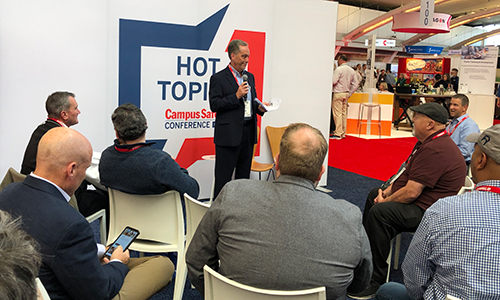Last week’s Campus Safety Conference (CSC) at EDspaces offered top-notch training in school and university security, public safety and emergency management for the wide range of campus protection pros who came to learn and network at the event. Held November 3-5 at the David L. Lawrence Convention Center in Pittsburgh, in conjunction with EDspaces, the CSC featured presentations on a long list of need-to-know topics, a sponsor showcase featuring the latest products and services, as well as networking opportunities where attendees could share ideas, make new connections and have a lot of fun.
Beginners attended “Campus Safety 101: Physical Security and Crime Prevention for the Education Leader,” presented by Drew Neckar and Robert Nordby of Security Advisers Consulting Group. They discussed the strengths and weaknesses of proprietary security officers vs. contract security officers vs. law enforcement; crime prevention through environmental design (CPTED) and other security basics.
Meanwhile, attendees with more experience who were looking to improve access control at their institutions of higher education attended “Managing a Technology System Upgrade on Campus: Strategies and Lessons Learned from LaSalle University,” presented by LaSalle AVP of Public Safety Amanda Guthorn. In her presentation, Guthorn, along with her department applications administrator Mel Hagerty, described the incredibly complex process they had to go through to upgrade their access control system and locks. They provided tips on everything from selecting the right systems integrator and equipment manufacturers to obtaining buy-in from internal stakeholders, including facilities, IT, and other decision-makers.
Most of the presentations, however, applied to all of the attendees.
In the opening keynote, “The Mass Shooting Contagion Dilemma,” former FBI agent Katherine Schweit talked about how inappropriate media coverage of mass shootings often results in even more shootings. She provided guidance on how law enforcement can provide appropriate information to the news media so that the media can do their job while not inadvertently encouraging more shootings.
That message’s importance was highlighted the following day when Max Schachter, founder and CEO of Safe Schools for Alex, presented, “Turning Agony into Action: A Father’s Journey to make Schools Safer After the Parkland School Shooting.” Schachter, whose son Alex was killed in the 2018 Marjory Stoneman Douglas High School mass shooting, urged attendees to push for their states to provide school incident data to the dashboard his organization developed after Parkland. Doing so, Schachter said, would give schools, parents, law enforcement, and legislatures a user-friendly way they could keep track of the security incidents that happen on each K-12 campus. He described his frustrating experience in trying to obtain incident data on the schools his other children attend.
“What I found was that all of this information was just housed in a massive Excel spreadsheet, completely useless and impossible for me to look up my kids’ school and determine if its data was good or bad,” Schachter said.
In response, he created a dashboard that several states are already participating in. For additional information, visit SafeSchoolsForAlex.org.
A wide variety of other topics were also covered at the CSC, including compassion fatigue, cybersecurity, incident command, funding, weather emergencies, gangs, child sexual abuse, and other issues of major concern.
Additionally, attendees in the market for new solutions to their security, public safety and emergency management challenges visited the CSC pavilion in the sold-out exhibit hall. The pavilion featured a wide variety of sponsors, including providers of systems integration services, software, video surveillance, access control, metal detection, vehicles, window security film, emergency notification, locks, window shades, visitor management and more.
CSC attendee Christopher Balcik of the Pennsylvania State Police was impressed with the show: “I learned a lot. There were a lot of opportunities to meet with different professionals in the safety industry, and I enjoyed the presentations. I hope to come back.”
Timothy Higgins, who is director of campus safety and security for Saint Ignatius High School in Cleveland, Ohio, also gave the show two thumbs up: “For anyone responsible for campus safety and security, this conference provides the opportunity not only to gain insight into topics of concern by industry-leading experts, it provides and encourages peer networking and information sharing.”
CSC staff are already preparing for next year’s events, which will take place in Bethesda, Maryland (June 20-22) and Fort Worth, Texas (July 18-20). More information on these 2022 conferences will soon become available on CampusSafetyConference.com.







